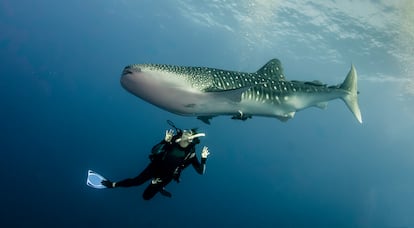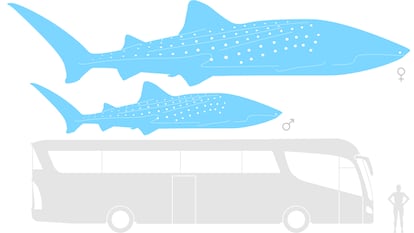Misguided ecotourism may lead to changes in whale shark behavior
Scientists denounce the effects of scuba diving with this species and question whether tourist activities are harmful to animals

The whale shark, the largest fish in the world, has become a popular tourist attraction. Travelers and scientists have been visiting their marine habitats for years to observe, interact and take photos of this docile giant. British biologist Joel Gayford studied their behavior in the waters around the Mexican state of Baja California Sur, and published a study in Nature showing that human interaction has affected their behavior and environment.
In contrast to previous studies done using underwater or boat filming, Gayford used drones to observe whale shark movements without disrupting their natural behavior. The images were then analyzed using algorithms and statistics. The findings indicate that the presence of humans increases the likelihood of behavioral changes in whale sharks, such as prolonged periods of disturbance, higher energy expenditure and reduced speed.
According to Gayford, a shark expert from Imperial College London, this change in behavior can affect the animals’ habitat preference, leading to significant impacts known as trophic cascades. “When a population of sharks changes its preferred location, it affects the abundance of the species it feeds on. This creates a cascade effect, causing changes in the abundance of many species throughout an entire ecosystem,” said Gayford. This species plays a critical role in transferring nutrients between ecosystems. Therefore, leaving an area or experiencing difficulties in finding food can have lasting effects on nutrient cycling. “The activities and changes in the landscape they bring can have disastrous effects on migration, reproduction and other forms of life,” he said.
Whale sharks can grow to over 30 feet long and are known for their prominent white spots. They primarily feed on plankton and are harmless, which makes them perfect for ecotourism. However, respecting their space can be difficult because they are such a popular attraction. Guides ask tourists to follow three simple rules when diving around whale sharks: “Do not touch, do not ride, do not get in their way.” But is it enough to maintain a distance of 15–20 feet, prohibit flash photography, and reduce boat speed?
Irene Gómez, a marine biologist from the University of Granada (Spain), has been living in the Maldives for nine years and specializes in whale sharks. In the South Ari Marine Protected Area where Gómez conducts her research, these magnificent creatures can be observed every day throughout the year. She says whale shark diving has become very popular and many people do not comply with the rules of coexistence. While some tour operators have great respect for their habitat, tourism can have a negative impact on the species. Of the 708 whale sharks identified in the area, 76% have been injured, mainly by propeller cuts from boats violating speed limits.
According to Gayford, to prevent “potentially negative” behavioral changes in whale sharks, increasing the minimum distance between humans and sharks is essential. Similar behavioral changes have been observed in other species. Mexico’s National Commission for Protected Environments suspended shark tourism around Baja California earlier this year due to “unsafe practices that endangered the species.” Before the ban, adventurers would go cage diving to catch a glimpse of an endangered white shark. Shark ecotourism is a worldwide industry, with popular destinations like Australia, the Maldives, the coast of Mozambique, Indonesia, and the Philippines.

Sharks are among the most endangered of all vertebrates. According to research by the International Union for Conservation of Nature (IUCN), more than a third of open-ocean sharks and rays are in danger of extinction. Climate change, habitat destruction and overfishing are the main threats to sharks. Illegal fishing has had a significant impact, especially in Asian countries where sharks are considered a delicacy. China is one of the main consumers, and a complete shark can sell for $3,200-$4,200 there. Shark meat and fins are consumed, while the skin is used as leather to make purses, bags and other products.
Ecotourism is a distinct style of vacation that aims to be more responsible towards nature. However, if not properly managed, it can also lead to negative environmental impacts. Pollution, ecosystem degradation, and alteration of animal habits, as suggested by this study, are among these potential effects. “Real ecotourism requires enforcing standards and responsible behavior. Just because you put the green label on something doesn’t mean it really is,” said Gómez.
In certain situations, ecological tourism might not have noticeable environmental impacts. However, experts emphasize the need for additional research and collaboration. Gayford is concerned over the lack of integration between scientists and regulatory bodies in addressing activities that put species at risk, and urges “greater cooperation between scientists and ecotourism operators to ensure the safety of all.”
Sign up for our weekly newsletter to get more English-language news coverage from EL PAÍS USA Edition
Tu suscripción se está usando en otro dispositivo
¿Quieres añadir otro usuario a tu suscripción?
Si continúas leyendo en este dispositivo, no se podrá leer en el otro.
FlechaTu suscripción se está usando en otro dispositivo y solo puedes acceder a EL PAÍS desde un dispositivo a la vez.
Si quieres compartir tu cuenta, cambia tu suscripción a la modalidad Premium, así podrás añadir otro usuario. Cada uno accederá con su propia cuenta de email, lo que os permitirá personalizar vuestra experiencia en EL PAÍS.
¿Tienes una suscripción de empresa? Accede aquí para contratar más cuentas.
En el caso de no saber quién está usando tu cuenta, te recomendamos cambiar tu contraseña aquí.
Si decides continuar compartiendo tu cuenta, este mensaje se mostrará en tu dispositivo y en el de la otra persona que está usando tu cuenta de forma indefinida, afectando a tu experiencia de lectura. Puedes consultar aquí los términos y condiciones de la suscripción digital.








































